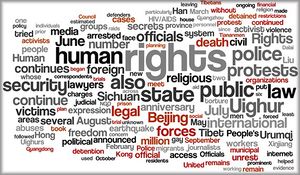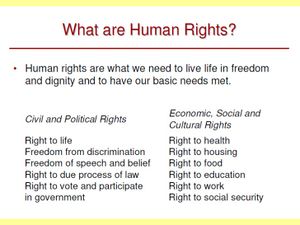Human Rights: Difference between revisions
No edit summary |
No edit summary |
||
| Line 1: | Line 1: | ||
[[File:humanrights1.jpg|right|thumb|Human rights, Natural rights and legal rights are not exactly the same. ]] | [[File:humanrights1.jpg|right|300px|thumb|Human rights, Natural rights and legal rights are not exactly the same. ]] | ||
What is human rights and who has the power or right to define them? | What is human rights and who has the power or right to define them? | ||
| Line 12: | Line 12: | ||
"Human rights are distinct from civil liberties, which are freedoms established by the law of a particular state and applied by that state in its own jurisdiction. Human rights laws have been defined by international conventions, by treaties, and by organizations, particularly the United Nations." | "Human rights are distinct from civil liberties, which are freedoms established by the law of a particular state and applied by that state in its own jurisdiction. Human rights laws have been defined by international conventions, by treaties, and by organizations, particularly the United Nations." | ||
[[File:humanrights2.jpg|right|thumb|Some people go so far as to think Human rights are what people need to live in freedom and dignity and ''have our needs met''. Met by whom? Can you take away the natural rights of others to meet those needs and who decides what needs are legitimate?]] | [[File:humanrights2.jpg|right|300px|thumb|Some people go so far as to think Human rights are what people need to live in freedom and dignity and ''have our needs met''. Met by whom? Can you take away the natural rights of others to meet those needs and who decides what needs are legitimate?]] | ||
Natural rights, which are supposed to come from God and defined by [[Natural Law]], are not the same as human rights. "Although both natural rights and human rights are universal, there are fundamental differences between the two. First of all, natural inalienable rights do not come from government. Governments only secure these rights—that is, they create the political conditions that allow one to exercise them." | Natural rights, which are supposed to come from God and defined by [[Natural Law]], are not the same as human rights. "Although both natural rights and human rights are universal, there are fundamental differences between the two. First of all, natural inalienable rights do not come from government. Governments only secure these rights—that is, they create the political conditions that allow one to exercise them." | ||
Revision as of 21:32, 5 October 2017

What is human rights and who has the power or right to define them?
Human rights and legal rights are not exactly the same. There is a difference which depends on who you are asking.
At first examination a comparison might sound good.
"In simplest terms, the difference between a human and civil right is why you have them. Human rights arise simply by being a human being. Civil rights, on the other hand, arise only by virtue of a legal grant of that right, such as the rights imparted on American citizens by the U.S. Constitution."
So who defined Human rights?
"Human rights are distinct from civil liberties, which are freedoms established by the law of a particular state and applied by that state in its own jurisdiction. Human rights laws have been defined by international conventions, by treaties, and by organizations, particularly the United Nations."

Natural rights, which are supposed to come from God and defined by Natural Law, are not the same as human rights. "Although both natural rights and human rights are universal, there are fundamental differences between the two. First of all, natural inalienable rights do not come from government. Governments only secure these rights—that is, they create the political conditions that allow one to exercise them."
UNIVERSAL DECLARATION OF HUMAN RIGHTS (UDHR)
Official Document
Article 26. of the UDHR
- Section 3 Parents have a prior right to choose the kind of education that shall be given to their children.
Rights |
Property rights |
Human Rights |
Human Events |
Law |
Natural Law |
Civil law |
Legal |
Common Law |
Fiction of law |
UNIVERSAL DECLARATION OF HUMAN RIGHTS |
Parents have a prior right |
Universal Declaration on Bioethics and Human Rights |
Human resources |
Merchandise |
Employ |
Universal Service |
Tribute |
Corvee |
The Way |
Foolishly |
Foolish virgins |
The Right of Self-determination |
Fraud |
Free Assemblies |
CORE |
Righteousness |
Workers of Iniquity |
Doers of the Word |
Fruit |
Law
Law |
Natural Law |
Legal title |
Common Law |
Fiction of law |
Stare decisis |
Jury |
Voir dire |
Consent |
Contract |
Parental contract |
Government |
Civil law |
Civil Rights |
Civil Government |
Governments |
No Kings |
Canon law |
Cities of refuge |
Levites |
Citizen |
Equity |
The Ten Laws |
Law of the Maat |
Bastiat's The Law and Two Trees |
Trees |
The Occupy Refuge Movement |
Clive Bundy |
Hammond |
Barcroft |
Benefactors |
Gods |
Jury |
Sanhedrin |
Protection |
Weightier matters |
Social contract |
Community Law |
Perfect law of liberty |
Power to change |
Covet |
Rights |
Anarchist |
Agorism |
Live as if the state does not exist |